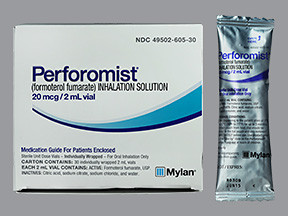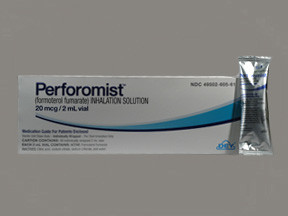FORMOTEROL SOLUTION - INHALATION
PHONETIC PRONUNCIATION: (for-MOW-ter-all)
COMMON BRAND NAME(S): Perforomist
GENERIC NAME(S): formoterol fumarate
Uses
USES: Formoterol is used as a long-term (maintenance) treatment to prevent or decrease breathing problems caused by ongoing lung diseases (chronic obstructive pulmonary disease-COPD, including chronic bronchitis and emphysema). Formoterol belongs to the class of drugs known as long-acting inhaled beta-agonists. It works by opening air passages in the lungs to make breathing easier. This effect helps to reduce wheezing, coughing, and shortness of breath. This medication does not work right away and should not be used for sudden attacks of breathing trouble. Your doctor must prescribe a quick-relief inhaler (e.g., albuterol, also called salbutamol in some countries) for sudden shortness of breath while you are using formoterol. You should always have a quick-relief inhaler with you. Formoterol is usually used with other medications such as corticosteroids (inhaled or taken by mouth). However, it should not be used with other long-acting inhaled beta agonists (such as arformoterol, salmeterol) because doing so may increase your risk for side effects.
How to use FORMOTEROL SOLUTION - INHALATION
HOW TO USE: Read the Medication Guide provided by your pharmacist before you start using this medication and each time you get a refill. This medication is used with a special machine called a nebulizer that changes the solution to a fine mist that you inhale. Learn all instructions for the use of this medication and the nebulizer equipment. Do not use the solution if it is discolored. If you have any questions, consult your doctor or pharmacist. This medication does not require any mixing before use. Using a mouthpiece or face mask with the nebulizer, inhale the prescribed dose of medication into your lungs, usually twice daily (morning and evening) or as directed by your doctor. The two doses should be about 12 hours apart. Each treatment usually takes about 9 minutes. Give this medication only through a nebulizer. Do not swallow the solution. Do not mix with other medicines in your nebulizer. Use this medication regularly to receive the most benefit from it. To help you remember, use it at the same times each day. To prevent infections, clean the nebulizer and mouthpiece/face mask according to the manufacturer's directions. Do not use more of this medication or use it more often than prescribed because doing so may cause serious side effects. The manufacturer recommends that you do not use more than 2 vials a day. Do not stop using this medication or change your dose without consulting your doctor. Some conditions may become worse when the drug is suddenly stopped. Your dose may need to be gradually decreased. If you have been using a quick-relief inhaler (e.g., albuterol, salbutamol) on a regular daily schedule (such as 4 times daily), your doctor will direct you to stop this schedule and use the quick-relief inhaler only as needed for sudden shortness of breath. Consult your doctor for details. Learn which of your medications/inhalers you should use every day and which you should use if your breathing suddenly worsens (quick-relief drugs). Ask your doctor ahead of time what you should do if you have new or worsening cough or shortness of breath, wheezing, increased sputum, waking up at night with trouble breathing, if you use your quick-relief inhaler more often, or if your quick-relief inhaler does not seem to be working well. Learn when you can treat sudden breathing problems by yourself and when you must get medical help right away. Tell your doctor if your symptoms do not improve or if they worsen.
Side Effects
Precautions
Interactions
Overdose
Images
Reviews
Warning
WARNING: Rarely, in patients treated for asthma, serious (sometimes fatal) asthma-related breathing problems have occurred with the use of long-acting inhaled beta agonists (e.g., salmeterol). Because formoterol is similar to salmeterol, it may also cause these problems. This form of formoterol is not approved to treat asthma. Consult your doctor or pharmacist for more details.
Disclaimer
IMPORTANT: HOW TO USE THIS INFORMATION: This is a summary and does NOT have all possible information about this product. This information does not assure that this product is safe, effective, or appropriate for you. This information is not individual medical advice and does not substitute for the advice of your health care professional. Always ask your health care professional for complete information about this product and your specific health needs.


No Reviews Yet